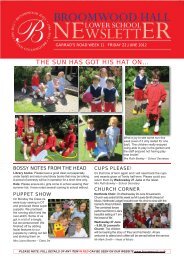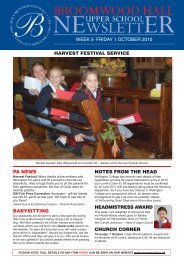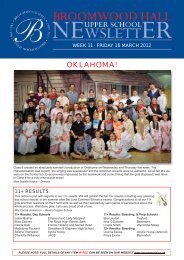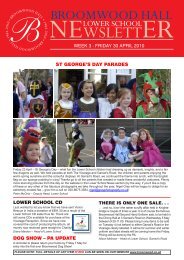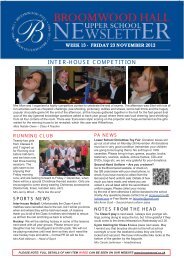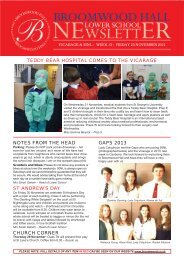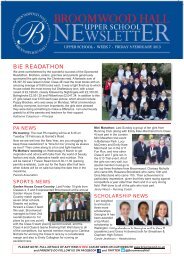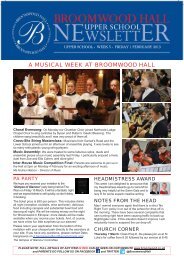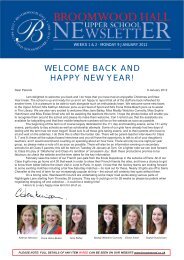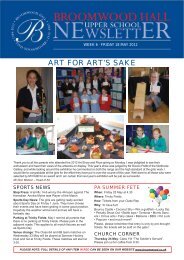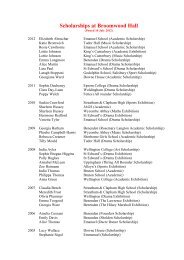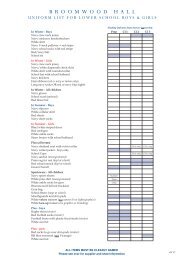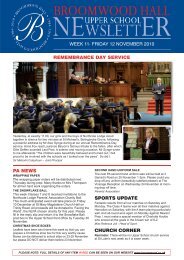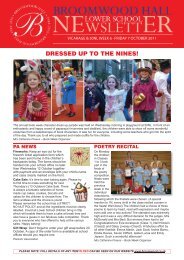of policies - Broomwood Hall
of policies - Broomwood Hall
of policies - Broomwood Hall
You also want an ePaper? Increase the reach of your titles
YUMPU automatically turns print PDFs into web optimized ePapers that Google loves.
BROOMWOOD HALL<br />
EARLY YEARS<br />
FOUNDATION STAGE<br />
POLICY HANDBOOK<br />
For<br />
The Lower School<br />
(vicarage & 50 NIGHTINGALE LANE)<br />
The Lower school<br />
(Garrad’s Road)
INDEX OF POLICIES<br />
The following <strong>policies</strong> should be read in conjunction with the whole school <strong>policies</strong> which<br />
are contained in the <strong>Broomwood</strong> <strong>Hall</strong> School Policy Handbook<br />
Early Years Children: Information for Parents<br />
Educational Visits<br />
Educational Visits – Risk Assessments<br />
Missing Child Policy & Procedures when a child is not collected on time<br />
Sun Protection Policy
EARLY YEARS FOUNDATION STAGE<br />
EARLY YEARS CHILDREN<br />
INFORMATION FOR PARENTS<br />
Our Ethos<br />
Every child should be happy, secure, valued and confident. At <strong>Broomwood</strong> <strong>Hall</strong> our philosophy is to<br />
value every child as a unique individual, who enjoys learning and thinking for him or herself. We<br />
provide a supportive and secure environment in which every child can flourish and learn at their own<br />
pace and in their own individual way. Our role is to stimulate and encourage their development and<br />
enjoyment <strong>of</strong> learning through a variety <strong>of</strong> different activities in secure indoor and outdoor situations,<br />
through play and through structured and creative activities. We encourage the growth <strong>of</strong> social skills<br />
and empathy amongst the children. The relationships which the children develop with each other and<br />
with our staff are central to their happiness and lay the best possible foundation for their future.<br />
<strong>Broomwood</strong> <strong>Hall</strong> Lower School<br />
<strong>Broomwood</strong> <strong>Hall</strong> Lower School caters for children from 4-8 years <strong>of</strong> age. All <strong>of</strong> the 4 year old children<br />
who enter the Prep classes at either The Vicarage (192 Ramsden Road) or 3 Garrad’s Road, are part <strong>of</strong><br />
our school community. The Head <strong>of</strong> each school will extend a warm welcome when you visit and will<br />
show you our facilities. They will be pleased to answer any questions about our Prep Classes and the<br />
rest <strong>of</strong> the school.<br />
We send prospective parents copies <strong>of</strong> the school’s prospectus on request, or parents themselves can<br />
download a copy from our web site. That document gives details the school locations, the names <strong>of</strong> the<br />
Principals and a great deal <strong>of</strong> information about the aims and ethos <strong>of</strong> the whole school. The curriculum<br />
and activities for our older children is explained in some detail. Further information about the school is<br />
available on our web site and copies <strong>of</strong> our <strong>policies</strong> are available on request or may be viewed in the<br />
school reception area. All new parents are given a copy <strong>of</strong> the school’s ‘A-Z Guide for parents’. At the<br />
beginning <strong>of</strong> every term, they are given a term dates booklet which contains an advance list <strong>of</strong> term<br />
dates, events and fixtures, a full list <strong>of</strong> staff and contact details.<br />
The Prep children make full use <strong>of</strong> the Lower School’s facilities. We expect them to remain pupils in<br />
our Lower School until they reach the age <strong>of</strong> 8 when they may move onto the Upper School (girls),<br />
Northcote Lodge (boys) or to another school.<br />
<strong>Broomwood</strong> <strong>Hall</strong> is registered with the DfE as an Early Years provider. We participate in the<br />
Government’s Nursery Education Funding scheme for 4 year old children.<br />
Admissions<br />
Children are accepted each year at The Vicarage and Garrad’s Road when they are between the ages <strong>of</strong><br />
4.0 and 4.11 years on 1 st September <strong>of</strong> any given year. Younger siblings <strong>of</strong> children already in the school<br />
(or at Northcote Lodge) have priority, normally resulting in between 40 and 50 places being available<br />
for other children. Our full Lower School Admissions Policy may be viewed in our reception area or can<br />
be sent to parents on request.
Early Years Children: Information for parents (continued) – page 2<br />
Equal opportunities policy<br />
We welcome children from a diverse range <strong>of</strong> backgrounds. We pride ourselves on being an inclusive<br />
community where there is complete equality <strong>of</strong> opportunity and everyone is valued for being him or<br />
herself. Copies <strong>of</strong> the school’s ‘Equal Opportunities Policy’ may be viewed in our reception area or sent<br />
to parents on request.<br />
Our Staff<br />
The Heads <strong>of</strong> the Lower School at Nightingale Lane and Garrad’s Road have day to day responsibility for<br />
their school and its activities, including those <strong>of</strong> the Prep Classes. The individual Prep class teachers are<br />
all qualified teachers who are assisted by full-time Classroom Assistants. Sport, French and music are<br />
taught by specialist teachers.<br />
Our daily routine for children in the Prep Classes<br />
For the first ten days <strong>of</strong> the Michaelmas (autumn) term, children in the prep classes are collected daily at<br />
noon. This is to ensure that the children have a gentle start to ‘big school’ and don’t become too tired in<br />
their first couple <strong>of</strong> weeks. On the eleventh day they all have their first lunch and full day at school.<br />
During the full school day, the children break at 10.30am for milk and biscuits and then go out to play.<br />
Weather permitting they play outside in the garden. The children break for lunch and outdoor play at<br />
around 12/12.30pm. After play, the prep classes have a short rest. All the prep children go home at<br />
3.00pm.<br />
Procedures when a child is not collected on time<br />
Please refer to our separate policy: ‘Missing Child Policy & Procedures when a Child is not Collected on<br />
Time’. A copy <strong>of</strong> this policy may be viewed in our reception area or sent to parents on request.<br />
Our Foundation Stage Curriculum<br />
At <strong>Broomwood</strong> <strong>Hall</strong> School we <strong>of</strong>fer a broad and balanced Foundation Stage curriculum for our<br />
youngest pupils which is based upon the Early Learning Goals and the six areas <strong>of</strong> learning. All children<br />
are given equal access and opportunities to develop their knowledge and skills in:<br />
1 Personal, social and emotional development<br />
2 Communication, language and literacy<br />
3 Problem solving, reasoning and numeracy<br />
4 Knowledge and understanding <strong>of</strong> the world<br />
5 Physical development<br />
6 Creative development<br />
All children learn through play with a mixture <strong>of</strong> child initiated and teacher led learning opportunities.<br />
Learning takes place both indoors and outdoors. We introduce different topics which the children<br />
explore through a variety <strong>of</strong> mediums, including books, art, clay, drama, music, ICT, crafts and model<br />
making. We gradually introduce synthetic phonics and the basics <strong>of</strong> literacy are taught daily through a<br />
structured reading scheme and rhyme. Numeracy is introduced through different activities, such as<br />
counting games, weighing activities and measuring, and is also taught daily. All children are encouraged<br />
to participate in dance, music and where possible, swimming. All children are gradually introduced to<br />
the principles <strong>of</strong> writing, and to the use <strong>of</strong> computers. By the end <strong>of</strong> their Prep year, the children are<br />
enthusiastic and confident learners, who are ready for the more structured, less play-based, environment<br />
<strong>of</strong> Class 1.<br />
Copies <strong>of</strong> the Lower School’s full ‘Curriculum Policy’ may be viewed in our reception area or sent to<br />
parents on request
Early years children: Information for parents (continued) – page 3<br />
Assemblies<br />
Assembly is held every day apart from the day we attend our weekly church service. Assemblies are<br />
formal occasions which foster the development <strong>of</strong> self-restraint and a collective spirit. They are basically<br />
Christian; but are designed to be respectful <strong>of</strong> other faiths. Assemblies provide an excellent public<br />
setting in which to commend children for special work, acts <strong>of</strong> kindness or helpfulness, and to reward<br />
them with stickers/special certificates/gold stars.<br />
Annual Curriculum Meeting<br />
All parents <strong>of</strong> children in the Prep classes are invited to an annual curriculum meeting early in the<br />
Michaelmas (autumn) term, when the aims <strong>of</strong> the year’s curriculum, the topics that will be studied and<br />
the methods <strong>of</strong> delivering the curriculum through play, structured activities and outdoor activities will<br />
be briefly explained.<br />
Behaviour<br />
Even the youngest children are encouraged to behave towards each other with kindness and<br />
consideration. They have to learn to look after their own possessions and to respect other’s possessions.<br />
We expect them to be honest, helpful and polite, and to work hard and to listen to others. They should<br />
respect everyone and learn to value differences and diversity.<br />
Each Prep Class teacher is in charge <strong>of</strong> the management <strong>of</strong> behaviour in their class. We explain to<br />
children why some forms <strong>of</strong> behaviour are unacceptable and hurtful to others. We rarely need to impose<br />
sanctions; but sometimes we may remove a treat for hurtful behaviour. Occasionally, a child may be<br />
sent to see the Head, who will explain the inappropriateness <strong>of</strong> a particular action; but such instances are<br />
rare<br />
Parents are informed verbally or via a note in the homework diary when any sanction or repro<strong>of</strong> is<br />
needed, and in cases <strong>of</strong> repeated instances <strong>of</strong> hurtful or inappropriate behaviour, they will be invited into<br />
the school to discuss the situation with their child’s class teacher and/or Head and to agree a joint way <strong>of</strong><br />
handling the difficulty.<br />
Copies <strong>of</strong> the ‘Lower School Behaviour Policy’ may be viewed in our reception area or sent to parents<br />
on request.<br />
Homework (prep) Diary<br />
Every child is given a prep diary from the time that he or she joins the school. This is the main method<br />
for communications between parents and the school. We ask you to write down anything relevant that<br />
might affect his or her performance, such as a late evening.<br />
Every child has reading activities every night. We will talk to you further about this when we meet. But<br />
it is our belief that acquiring the habit <strong>of</strong> study at home will stand your child in good stead throughout<br />
his or her education.<br />
Outdoor Learning<br />
All <strong>of</strong> the children play in our secure outdoor space during morning and afternoon breaks, except in the<br />
worst weather. We also use the outdoor space for supervised activities, involving playing with water,<br />
sand and some ball games. Prep children are encouraged to plant and grow their own seeds. The<br />
children are regularly taken in supervised groups inside the secure school grounds and to the local<br />
common to learn about the seasons <strong>of</strong> the year, by collecting autumn leaves, observing animals etc.
Early Years Children: Information for parents (continued) – page 4<br />
Visits<br />
We organise local excursions (park, church, library, farm, fire-station, common,) which are designed to<br />
help the children to acquire a basic understanding <strong>of</strong> our traditions, <strong>of</strong> the natural world and <strong>of</strong> the<br />
importance <strong>of</strong> other cultures. Our term date booklets list the major visits that are due to take place<br />
during each term and further details are provided in our weekly newsletters for parents. We require<br />
parents to sign a permission slip for these excursions at the beginning <strong>of</strong> each school year. Copies <strong>of</strong> our<br />
policy on ‘Visits for Early Years Foundation Stage Children’ may be viewed in our reception area or sent<br />
to parents on request.<br />
Food and Drink<br />
Children are <strong>of</strong>fered a drink <strong>of</strong> milk or water and a plain biscuit or fruit at morning break. Drinking<br />
water is available throughout the day.<br />
A two course lunch is provided every day, which all children are required to eat unless they fall into one<br />
<strong>of</strong> our exceptions categories noted below. A member <strong>of</strong> staff sits at each table to eat with the children<br />
and whose job is to encourage the children to try everything and ensure that second helpings are <strong>of</strong>fered.<br />
Children are given stamps on their hands when they clean their plates (or eat something that they have<br />
not enjoyed in the past).<br />
Weekly menus are displayed at the entrance to each Lower School. Due to space and time constraints,<br />
we are unable to <strong>of</strong>fer any choice, save the very limited ones listed under exceptions below. We <strong>of</strong>fer<br />
our pupils a varied, healthy and tasty diet and serve only food which we know the majority <strong>of</strong> children<br />
like and will eat.<br />
Parents are asked not to send food or drink to school with their child.<br />
Special Diets<br />
The school is a nut free zone and all our cooking ingredients are checked to ensure that they comply<br />
with this policy. Parents <strong>of</strong> children who have allergies to any food product, or who have special dietary<br />
requirements, are asked to make this clear in the school’s medical questionnaire. They should inform the<br />
school at once if their child subsequently develops an intolerance <strong>of</strong> any food. The school Head and<br />
Chef are happy to see any parent who has concerns about their son or daughter’s medical condition, and<br />
to devise a special menu, where practically possible.<br />
Exceptions<br />
The school does not make any exceptions, other than the following:<br />
o Vegetarians - there will always be a vegetarian alternative available.<br />
o Low Sugar* - children on a low sugar diet may have fruit for puddings on days when the<br />
pudding contains additional sugar<br />
o Gluten free* - the school cook will re-heat any special meals which are brought in that morning<br />
by the parent <strong>of</strong> the child which requires such specialised foods<br />
o Non-dairy* - on days when the main course contains dairy products, the vegetarian alternative<br />
will always be non-dairy. If the pudding is dairy, non-dairy children may have fruit.<br />
* Children requiring these diets must have a doctor’s certificate before we will make these available.
Early Years Children: Information for parents (continued) – page 5<br />
Keeping In Touch<br />
We appreciate that sending your child to school is a big step and that it is understandable that some<br />
parents may worry or feel anxious about their child’s well-being and happiness. That is why we invite<br />
your child to spend an hour with their new teacher the day before term starts, meet their new classmates<br />
and see their new classroom. During this time you will be invited to have a cup <strong>of</strong> tea with the Head and<br />
the other new parents, receive any further information and check your child’s special arrival time for the<br />
first and second mornings. We are also happy for you or your child’s carer to accompany your child<br />
into their classrooms on arrival, during the Michaelmas (autumn) term. By Christmas, all children<br />
should be happy to come into the classroom independently.<br />
Your child’s Form Teacher is responsible for your child’s pastoral care and, with our small classes,<br />
quickly gets to know every individual child extremely well. You will see your Form Teacher twice a<br />
day when you drop <strong>of</strong>f and collect your child, and many worries can be speedily resolved by an informal<br />
chat. Otherwise, you are welcome to make an appointment for a longer (or more private) conversation<br />
with him/her, or with the relevant Head. Notes <strong>of</strong> the meeting will be taken and a letter or postcard<br />
will be sent to follow up on agreed points. Any concerns will always be treated in complete confidence.<br />
All children have a home-school diary called their ‘prep diary’. This is checked daily by the class teacher<br />
and is a reliable form <strong>of</strong> communication about pastoral care, reminders, housekeeping issues, feedback<br />
on reading and homework and requests for meetings. Parents are asked to read and sign their child’s<br />
prep diary every day.<br />
We have a weekly <strong>Broomwood</strong> <strong>Hall</strong> newsletter, which is sent home in the childrens’ school bags each<br />
Friday and is full news about activities and outings. We also encourage children to take home their art<br />
work for you to admire and display at home! All Lower School children participate in a weekly church<br />
service and parents are warmly invited to join us at these services. We send invitations to parents to a<br />
number <strong>of</strong> events during the year including the Prep Class Play, the Carol Service (which involves the<br />
whole Lower School), Pancake Day Races, Concerts and Competitions.<br />
Early Years Foundation Stage (EYFS) Pr<strong>of</strong>ile<br />
At the end <strong>of</strong> your child’s “early years” education, we complete a detailed “EYFS Pr<strong>of</strong>ile” which<br />
summarises his or her learning and development against the assessment scales and learning goals, which<br />
have been determined by the Government. You will <strong>of</strong> course, receive your own copy, which we are<br />
happy to discuss with you. We are required to send your child’s EYFS to our Local Education<br />
Authority.<br />
Parents’ Evenings<br />
We start each academic year with a curriculum meeting to which all parents in the year group are<br />
invited, at which we outline the Prep class plans for the year. We hold parent/teacher interviews midway<br />
through the Michaelmas (autumn) and Hilary (spring) term at which parents have the opportunity<br />
to talk to their child’s teacher about their progress and to raise any worries which they may have.<br />
Reports<br />
Children are assessed through observations, questioning and guiding. Narrative reports, which<br />
supplement the comments in the prep diary, are prepared on each child and sent to parents at the end <strong>of</strong><br />
the Michaelmas (autumn) and Hilary (spring) terms. Report slips are sent home at the end <strong>of</strong> the<br />
Trinity (summer) term.
Early Years Children: Information for parents (continued) – page 6<br />
Storage <strong>of</strong> Records<br />
We store all <strong>of</strong> our pupil records securely. Parents may arrange to see their child’s records in<br />
accordance with the school’s policy on ‘Reports and Record Keeping’ which is available to view in our<br />
school <strong>of</strong>fice or may be sent to you on request. The School is registered under the Data Protection Act<br />
and complies with its provisions for example, about the disclosure <strong>of</strong> information relating third parties.<br />
Complaints<br />
We hope that you will not feel the need to complain and that any difficulty can be sensitively and<br />
efficiently handled before it reaches that stage. However, the school’s ‘Complaints Policy’ is available to<br />
view in our school <strong>of</strong>fice or may be sent to parents on request.<br />
Because our Prep classes are part <strong>of</strong> an independent school, the Independent Schools Inspectorate (ISI) is<br />
responsible for inspecting the Prep department. However, if you as parents are dissatisfied with the<br />
outcome <strong>of</strong> a complaint, you are entitled to make a complaint directly to Ofsted. The Ofsted leaflet:<br />
“Complaints to Ofsted about Schools: Guidance for Parents” reference 080113 may be downloaded<br />
from www.<strong>of</strong>sted.gov.uk .<br />
Child Protection<br />
The school’s child protection policy is enforced rigorously throughout the school. A copy <strong>of</strong> our ‘Child<br />
Protection Policy’ is on our web site. All our school <strong>policies</strong>, including our policy for the ‘Safer<br />
Recruitment <strong>of</strong> Staff, are available to view in our school <strong>of</strong>fice or may be sent to parents on request.<br />
Medical Matters<br />
Please keep your child at home if he or she is ill or infectious, and phone us on the first day <strong>of</strong> illness.<br />
An ill child will not be happy in school, and will only infect others. We will telephone you and ask you<br />
to collect your child if he or she becomes ill during the day. When recovered, your child should return<br />
to school with a letter explaining why they were kept at home. Only if a child is away for an extended<br />
period will work be sent home.<br />
A first aid box is located in the school <strong>of</strong>fice and in each class room. They are checked regularly and, if<br />
necessary, replenished. All teachers on-site are qualified first aiders. We will always contact you at once<br />
if your child suffers anything more than a trivial injury, or if he or she becomes unwell during school<br />
day, or if we have any worries or concerns about his or her health. We will inform you by way <strong>of</strong> a note<br />
in your child’s prep diary if he or she has a minor accident or graze at school.<br />
Care<br />
Although your child will normally receive medical care from your family GP practice; we hold specific<br />
medical information on all our pupils in order to ensure that we can provide appropriately for their<br />
needs, or look after them if they are injured or have an accident. All parents are required to complete<br />
and return a medical questionnaire and emergency consent form before their child joins the school.<br />
All our new children are invited to have a hearing and sight test in October by specialists known to the<br />
school. A charge is made for this screening and parents are sent a letter asking if they wish their child to<br />
be tested.<br />
Children with Medical Needs<br />
If your child has medical needs, we will invite you to a meeting with the Head to discuss thoroughly the<br />
care and/or support that will be required.
Early Years Children: Information for parents (continued) – page 7<br />
Emergency Medical Treatment<br />
We require parents to complete an emergency consent form which authorises the Head or a deputy<br />
acting on her behalf, to consent on the advice <strong>of</strong> an appropriately qualified medical specialist to your<br />
child receiving emergency medical treatment if we are unable to contact you in time. This treatment<br />
may include having a general anaesthetic and surgical procedure under the NHS.<br />
Medical Records<br />
We record all accidents and injuries to your child and <strong>of</strong> all medicines that are given to him or her. We<br />
will always tell you in writing if your child has received any form <strong>of</strong> medical treatment – however<br />
minor.<br />
Medicines and Treatments Brought to School for Pupils<br />
The school must be advised, in writing, <strong>of</strong> any medication that you bring into the school for your child.<br />
The school has a form that will need to be completed by you with regards to the administration <strong>of</strong> the<br />
medicines/treatment. If your child has a medical condition which necessitates regular access to<br />
medication, please inform the Head so that an appropriate regime can be followed. The relevant staff<br />
will be informed, in confidence, <strong>of</strong> any condition that is likely to affect your child in any area <strong>of</strong> school<br />
life. We will work with you in making arrangements that work best for your child. A copy <strong>of</strong> our<br />
Policy for ‘Administering Medicines’ can viewed in our school <strong>of</strong>fice or may be sent to parents on<br />
request.<br />
Maintaining a Safe Environment<br />
The safety <strong>of</strong> the children is our highest priority, and because they are so young, we need to be<br />
particularly vigilant. We will therefore:<br />
1 Only allow your child to go home with you, unless we have received your advance permission<br />
(preferably in writing) that he or she may be collected by another adult.<br />
2 Never allow a child to leave the premises unsupervised. There is always at least one adult in<br />
charge <strong>of</strong> the secure outside play area.<br />
3 Ask all visitors to identify themselves and to state their business before we give them access to<br />
the premises. Visitors sign in and wear security badges for the duration <strong>of</strong> their visit. They sign<br />
out on leaving.<br />
4 Register all pupils at the start <strong>of</strong> the morning and afternoon sessions.<br />
5 Ensure that the children are personally handed over to their parents or carers by the teachers at<br />
the end <strong>of</strong> the day.<br />
A copy <strong>of</strong> our ‘Missing Child Policy & Procedures for when a Child is not Collected on Time’ is<br />
available to view in our reception area or may be sent to parents on request.<br />
Health and Safety<br />
We update and review our risk assessments on our classrooms and other indoor and outdoor areas, and<br />
inspect all the equipment and toys used by the children every year in order to ensure that potential<br />
hazards are kept to a minimum.<br />
Next annual policy review date: November 2012<br />
Last updated: November 2011 by Sarah Graham and Alison Povall
EARLY YEARS FOUNDATION STAGE<br />
EDUCATIONAL VISITS<br />
Introduction<br />
<strong>Broomwood</strong> <strong>Hall</strong> places great value on educational visits for all <strong>of</strong> its pupils, including the very<br />
youngest, recognising that they provide a unique opportunity to enhance the curriculum and to extend<br />
and support class based work. They provide opportunities which cannot be provided on site and can<br />
extend the knowledge and understanding <strong>of</strong> our youngest pupils. All <strong>of</strong> our visits for this age group are<br />
local – most last only half a day. We do not take Prep class children on overnight or foreign visits.<br />
Our Visits<br />
Supervision<br />
Generous staffing levels, close supervision and proper protective clothing are essential for even the<br />
shortest <strong>of</strong> excursions. For all sessions within the enclosed school grounds, the children are supervised<br />
by their Teacher and a Teaching Assistant.<br />
Staff Ratios and Responsibility<br />
We operate a staffing ratio <strong>of</strong> 1:10 for all <strong>of</strong>f-site visits involving children in our Prep classes. There is<br />
always at least one Teacher, one <strong>of</strong> whom will have been designated in charge <strong>of</strong> the visit. The Teacher<br />
is a qualified paediatric first aider.<br />
We may invite parents to volunteer to help with <strong>of</strong>f-site visits. Volunteers are never allowed to<br />
supervise children alone and are thoroughly briefed about their roles beforehand. CRB checks will be<br />
carried out on any parents who volunteer to help the school on a regular basis (once a week or more).<br />
The Reception Years (Prep Classes)<br />
All our Prep class children are 4 years old when they join us at the start <strong>of</strong> the Michaelmas term in<br />
September each year. They are ready to experience excursions <strong>of</strong>f-site and for a wider range <strong>of</strong> new<br />
experiences. During the year, depending on which school site they are based, they enjoy variety visits to<br />
local destinations including local church, fire station, a museum, a local pizza restaurant (to make<br />
pizzas), and a city farm.<br />
Our children are taken on regular walks in the school grounds and on the local common and by the end<br />
<strong>of</strong> their Prep year, they are confidently conducting work on the topic <strong>of</strong> mini-beasts and carrying out<br />
leaf and bark rubbings. Their climbing and balancing skills will have improved, together with their<br />
understanding <strong>of</strong> the cycle <strong>of</strong> nature, such as the first signs <strong>of</strong> spring.<br />
Keeping you informed<br />
The school’s term date booklet lists the visits that are due to take place over the coming term. Further<br />
information will be sent home via the weekly newsletter about every visit and whether it involves an<br />
extension to the normal length <strong>of</strong> the school day.<br />
All Prep class visits, apart from the Lower School Carol Service, return your child to the school at their<br />
conclusion. You may take your child home from the Church at the end <strong>of</strong> the Carol Service.
Educational Visits (continued) – Page 2<br />
Consent<br />
We require your written consent before we may take your child <strong>of</strong>f-site. A consent form for short<br />
outings will be sent to you when your child starts at the school. For day trips, we will send you a<br />
consent form specifically for that outing along with details <strong>of</strong> the procedures for that day.<br />
Safety: Advance Planning<br />
Risk Assessments<br />
Safety is our top priority. Even the shortest <strong>of</strong> visits needs to be thoroughly planned, and requires its<br />
own risk assessment, which must be reviewed thoroughly before a repeat visit is made. Our policy,<br />
conducting ‘Risk Assessments for Early Years Outings’, is available to view in our school reception or<br />
may be sent to parents on request.<br />
Head Counts<br />
The Teacher in charge conducts, or arranges for another Teacher or Teaching Assistant to conduct a<br />
head count <strong>of</strong> the children (recording the fact that we have done so):<br />
1 Before leaving school<br />
2 (If applicable) On sitting down in the coach<br />
3 On arrival at the destination<br />
4 On leaving the destination<br />
5 On arrival back at the school<br />
Where we walk, the children walk in pairs, with one adult at the front, one at the back and depending<br />
on the size <strong>of</strong> the party, others adults will be distributed in between. Children are reminded about basic<br />
road safety and <strong>of</strong> the expected standards <strong>of</strong> behaviour. When we travel by coach, a member <strong>of</strong> staff<br />
will check that all the pupils are sitting properly and wearing their seat belts.<br />
Missing Child Policy<br />
Our procedures are structured to ensure that this does not happen; but in the event that a child is<br />
missing – either from school, or on a visit, we follow the procedures set out in our ‘Missing Child’<br />
policy, a copy <strong>of</strong> which is available in the school reception or may be sent to parents on request.<br />
First Aid Kit etc<br />
The Teacher in Charge takes a first aid kit, list <strong>of</strong> emergency contact numbers and a mobile phone with<br />
him/her on every outing. We carry bottled water on all <strong>of</strong> our longer visits.<br />
Delay<br />
The Teacher in Charge will ring the school if there is any delay, for example, because <strong>of</strong> heavy traffic.<br />
The School Office will phone and/or send a text message to the parents to warn them <strong>of</strong> a delay.<br />
Role <strong>of</strong> the Teacher in Charge <strong>of</strong> the visit<br />
Every visit, however local, or short, must be planned in advance by the member <strong>of</strong> staff who is in charge<br />
<strong>of</strong> it. She/he will already have had previous experience <strong>of</strong> accompanying Prep class visits. The Teacher<br />
in Charge either holds a valid paediatric First Aid Certificate, or ensures that another member <strong>of</strong> staff<br />
accompanying the visit holds one.<br />
Role <strong>of</strong> the Education Visits Co-ordinator (EVC)<br />
At <strong>Broomwood</strong> <strong>Hall</strong>, the EVC is the Head <strong>of</strong> the relevant Lower School and is responsible for approving<br />
all requests for visits. She checks that the paperwork is correct, gives guidance on carrying out risk<br />
assessments, budgeting for visits and on permission slips, and keeps a “library” <strong>of</strong> reports on previous<br />
visits.
Educational Visits (continued) – Page 3<br />
Personal Liability and Insurance<br />
The DfE Guidance “The Health and Safety <strong>of</strong> Pupils on Educational Visits: A Good Practice Guide,”<br />
(www.teachernet.gov.uk) is required reading for all Teachers in Charge <strong>of</strong> a Prep Class visit as part <strong>of</strong><br />
their training in the responsibilities <strong>of</strong> the role. It explains that their responsibility is to “act as any<br />
reasonable parent would do in the same circumstances.” Staff who take part in visits and activities<br />
outside school may feel concerned about the possibility <strong>of</strong> being held personally liable if an accident<br />
should occur. However, they can be assured that <strong>Broomwood</strong> <strong>Hall</strong> School, as their employer, will<br />
always stand behind them in the unlikely event <strong>of</strong> an accident occurring, provided they have exercised<br />
reasonable care and followed the school’s guidelines.<br />
<strong>Broomwood</strong> <strong>Hall</strong> has £5 million <strong>of</strong> Employers’ Liability Insurance and £20 million <strong>of</strong> public liability<br />
insurance.<br />
Transport<br />
Use <strong>of</strong> Private Cars<br />
We aim not to transport Prep class children in private cars belonging to staff. However, the school<br />
insurance policy does cover us for this activity should it be deemed necessary to do so.<br />
School Minibuses<br />
No one is allowed to drive the school minibus unless their driving licence permits them to do so. For any<br />
minibus journey that involves Prep class children, there will always be a second member <strong>of</strong> staff present<br />
in the vehicle.<br />
Use <strong>of</strong> hired transport<br />
The school has a long-standing relationship with Wandsworth Community Transport and Redwing<br />
Coaches. It is a condition <strong>of</strong> booking that the Driver’s name and the number <strong>of</strong> his/her mobile phone is<br />
provided to the school when the hire arrangements are confirmed. We only book vehicles with frontfacing<br />
seats that are fitted with seat belts.<br />
Preparatory Arrangements<br />
Prep class visits are planned at least a term in advance, when dates need to be agreed with the EVC<br />
(Head). Parents will be told about the visits planned for the ensuing year at the annual curriculum<br />
meeting at the beginning <strong>of</strong> the Michaelmas (autumn) term. At that stage, it will probably not be<br />
necessary to finalise the dates <strong>of</strong> all <strong>of</strong> the short, local visits planned for the Hilary (spring) and Trinity<br />
(summer) terms; but a general indication will be given. All planned visits will be listed in the term date<br />
booklet which is given to the parents at the start <strong>of</strong> each term.<br />
During the Visit<br />
Primary responsibility for the safe conduct <strong>of</strong> the visit rests with Teacher in Charge. He or she has sole<br />
responsibility for amending the itinerary or canceling the visit in the event <strong>of</strong> unforeseen delay or sudden<br />
deterioration in weather conditions. She or he may delegate part or all <strong>of</strong> the responsibility for the<br />
following to one or more <strong>of</strong> the accompanying staff:<br />
1 Carrying out (and recording) head counts <strong>of</strong> the children on leaving school, on getting on and<br />
<strong>of</strong>f each form <strong>of</strong> transport, entering or leaving a theatre, museum, centre, etc<br />
2 Checking that all pupils wear their seat belts<br />
3 Enforcing expected standards <strong>of</strong> behaviour<br />
4 Keeping account <strong>of</strong> all expenditure<br />
5 Recording any accidents or near misses in the trip evaluation report.
Educational Visits (continued) – Page 4<br />
Illnesses or minor accidents<br />
If a child has a minor accident or becomes ill, the Teacher in Charge, or another member <strong>of</strong> staff will<br />
phone his or her parent’s emergency contact number at once and arrange for him/her to be collected. If<br />
contact cannot be made, the Teacher in Charge, or another member <strong>of</strong> staff, will take the child to the<br />
local hospital or, if the illness is more minor, back to the school. A member <strong>of</strong> staff will remain with the<br />
child at the hospital or school until a parent or carer arrives.<br />
Emergency Procedures<br />
In the event <strong>of</strong> a serious accident resulting in the death or injury <strong>of</strong> one or more <strong>of</strong> the pupils and staff,<br />
the Teacher in Charge’s first priority will be to summon the emergency services, and to arrange for<br />
medical attention for the injured. One <strong>of</strong> the accompanying members <strong>of</strong> staff will be detailed to<br />
accompany the injured pupil(s) to hospital and remain with the child(ren) until their parents arrive. The<br />
Teacher in Charge will ensure that the rest <strong>of</strong> the group are safe and looked after. He/She will then<br />
inform the Head (EVC) <strong>of</strong> what has happened, giving as full, calm and factual account as the<br />
circumstances permit.<br />
The Teacher in Charge, or depending on the seriousness <strong>of</strong> the incident, the Head, will arrange for the<br />
parents <strong>of</strong> the uninjured children to be contacted and asked to collect their children from either the<br />
venue or the school. Depending on the nature <strong>of</strong> the incident, we may decide to implement the school’s<br />
own model communications plan for informing both the families <strong>of</strong> the injured, and the families <strong>of</strong> those<br />
who are unhurt as swiftly as possible. In an era <strong>of</strong> instant communications, it may not be possible for us<br />
to be the first to break the news but we recognise that we have an important duty to speak personally to<br />
the parents <strong>of</strong> any pupil who has suffered some injury or mishap. We will use mass communication<br />
methods (SMS, email, messages on our website) for communicating with those whose children are not<br />
affected.<br />
Where possible, communication with the media should be left to the Head or Principal <strong>of</strong> <strong>Broomwood</strong><br />
<strong>Hall</strong>. The Teacher in Charge should refer the media to the Head or Principal’s <strong>of</strong>fice. If comment is<br />
unavoidable, it should be factual, calm and no attempt made to cover gaps in knowledge.<br />
A full record will be kept <strong>of</strong> the incident, the injuries and <strong>of</strong> the actions taken. The Finance Bursar will<br />
notify the insurers as quickly as possible.<br />
After the Trip<br />
Trip Report<br />
Following the trip, the Teacher in Charge will provide the EVC (Head) with a written trip evaluation<br />
report on the visit including observations and lessons learned. The report should also detail any accidents<br />
and near misses and any lost or damaged property.<br />
Expenditure<br />
The Teacher in charge is responsible for producing a schedule <strong>of</strong> all expenditure on the trip.<br />
Report for Directors<br />
The Head <strong>of</strong> the Lower School’s termly report to the Directors always contains a synopsis <strong>of</strong> all the<br />
school trips and visits that have taken place since the last meeting.<br />
Next annual policy review date: November 2012
SAMPLE WORDING FOR CONSENT LETTER<br />
Educational Visits (continued) – Page 5<br />
PREP CLASS [X] TRIP TO [LOCATION NAME] ON [DATE]<br />
Prep Class [x] will be visiting [location name and address] on [date] to introduce/continue with the topic<br />
<strong>of</strong> [topic name] this term.<br />
Please could you ensure your child wears full winter/summer uniform (including hats for the girls) and<br />
provide a NUT free disposable packed lunch with two drinks in a named plastic bag.<br />
The coaches will be leaving at [time] and returning to school by [time].<br />
Please would you complete and return the tear-<strong>of</strong>f consent form below to confirm that your child may<br />
go on the trip. If you are interested on being a helper on the day, please indicate this on the same form.<br />
Please be aware that names may have to be pulled out <strong>of</strong> a hat to choose the helpers, if we are oversubscribed.<br />
Those <strong>of</strong> you who will be helping will have a note put in your child’s prep diary.<br />
This consent form must to be returned to the class teacher or school <strong>of</strong>fice by [date].<br />
Thank you<br />
Teachers’ names<br />
PREP TRIP TO [LOCATION NAME] ON [DATE]<br />
I would like my child to go on the above trip.<br />
Name <strong>of</strong> child: ………………………………………………………….<br />
Class: ………………<br />
Signature <strong>of</strong> parent/guardian: ……………………………………………. Date: ………………..<br />
I would be willing to help out with the class trip.<br />
Name: ……………………………………………………………………………………………<br />
Please return this form to the class teacher or School Office by [date]
Educational Visits (continued) – Page 6<br />
SAMPLE TRIP EVALUATION FORM<br />
This form is to be completed after an excursion, attached to the Risk Assessment and sent to the Head<br />
within five working days <strong>of</strong> the excursion<br />
Excursion Information:<br />
Venue: ……………………………………………………<br />
Date: ……………………………………………………..<br />
Year Group ………………………<br />
Michaelmas/ Hilary/ Trinity 20……<br />
Names <strong>of</strong> teaching staff: …………………………………………………………………………..<br />
Names <strong>of</strong> teaching assistants: ………………………………………………………………………<br />
Names <strong>of</strong> Parent Helpers: …………………………………………………………………………<br />
No. <strong>of</strong> adults ………….. Number <strong>of</strong> children …………..<br />
Adult/child ratio 1: ………………<br />
Please provide any information that may be <strong>of</strong> benefit to the organisers <strong>of</strong> the next trip:<br />
Organisation <strong>of</strong><br />
children:<br />
Transport:<br />
Venue:<br />
Workshops:<br />
Lunch/cloakroom<br />
facilities<br />
Communication:<br />
Incidents:<br />
Parent Helpers:<br />
Other:<br />
Signed: ………………………………………... (Teacher in charge)<br />
Date: …………………….<br />
Heads Comments:<br />
Signed: ……………………………………………………………<br />
Date: …………………….
EARLY YEARS FOUNDATION STAGE<br />
EDUCATIONAL VISITS - RISK ASSESSMENTS<br />
Introduction<br />
<strong>Broomwood</strong> <strong>Hall</strong> is legally required to have risk assessments in place that cover a great many <strong>of</strong> their<br />
activities, including the many educational visits and trips made by all <strong>of</strong> their pupils. However, the<br />
Government places additional requirements on schools that cater for the youngest age group, which at<br />
<strong>Broomwood</strong> <strong>Hall</strong> is the Prep Classes. This policy is a companion document to our policy “EYFS -<br />
Educational Visits”<br />
What is a risk assessment?<br />
Anyone involved in the planning <strong>of</strong> a school trip must be 100% sure they have done all they can to create<br />
a safe environment for the pupils. A risk assessment is a tool for conducting a formal examination <strong>of</strong> the<br />
harm or hazard to people (or an organisation) that could result from a particular activity or situation.<br />
• A hazard is something with the potential to cause harm<br />
• A risk is an evaluation <strong>of</strong> the probability (or likelihood) <strong>of</strong> the hazard occurring<br />
• A risk assessment is the resulting assessment <strong>of</strong> the severity <strong>of</strong> the outcome (e.g. loss <strong>of</strong> life,<br />
destruction <strong>of</strong> property)<br />
• Risk control measures are the measures and procedures that are put in place in order to<br />
minimise the consequences <strong>of</strong> unfettered risk (e.g. staff training, clear work procedures,<br />
preliminary visits and insurance).<br />
The starting point<br />
The starting point for conducting a risk assessment on an outing is to:<br />
• Identify all <strong>of</strong> the potential hazards, such as a child getting lost, or run over, a traffic accident, a<br />
child falling over, sun burn, getting cold or wet on an outing.<br />
• Consider who might be affected by the hazards? The children, staff, volunteers, school<br />
property, school reputation. Children with any special needs need to be considered separately.<br />
• Identify which safety measures will reduce the potential impact <strong>of</strong> the hazard? Examples<br />
include: using a higher staff ratio on all outings than are used inside the school, ensuring that one<br />
member <strong>of</strong> the party is qualified in Paediatric First Aid, frequent head counts, a clear missing<br />
child policy that is known to all, taking a first aid kit and water, asking parents to send<br />
appropriate protective clothing to mitigate impact <strong>of</strong> weather, sound preparation in advance,<br />
including briefing all <strong>of</strong> the adults (staff and volunteers) on their respective roles. Emergency<br />
procedures should be rehearsed in advance with the accompanying staff.<br />
A sample <strong>of</strong> our internal risk assessment for EYFS outings is attached to this policy. Our own risk<br />
assessment analysis is <strong>of</strong>ten supplemented by a risk assessment from the venue itself which is specifically<br />
tailored to the needs <strong>of</strong> visiting school parties and supplied to us by the management <strong>of</strong> that organisation.
Educational Visits: Risk Assessments (continued) – Page 2<br />
Role <strong>of</strong> the Education Visits Co-ordinator (EVC)<br />
The role <strong>of</strong> the Education Visits Coordinator (EVC) in training and supporting staff who are involved in<br />
taking and leading visits <strong>of</strong> Prep class children is explained in our companion model policy: “EYFS -<br />
Educational Visits”. All new staff have a session on planning school visits as part <strong>of</strong> their induction<br />
training.<br />
Every risk assessment is checked and approved by the EVC as part <strong>of</strong> the process <strong>of</strong> approving each<br />
outing.<br />
Role <strong>of</strong> the Teacher in Charge<br />
Again, the role <strong>of</strong> the Teacher in Charge, and the training given to those who take on that important role<br />
is explained in our companion model policy: “EYFS - Educational Visits”. All Teachers in Charge are<br />
given assistance and training with conducting risk assessments, with emergency procedures, as part <strong>of</strong><br />
their training for the role. They understand the importance <strong>of</strong> setting clear procedures for everyone in<br />
the group – staff, volunteers and children.<br />
Library <strong>of</strong> Risk Assessments<br />
The EVC maintains a “library” <strong>of</strong> risk assessments which may be drawn on by anyone planning an outing.<br />
Next annual policy review date: November 2012
Educational Visits: Risk Assessments (continued) – Page 3<br />
SAMPLE RISK ASSESSMENT FOR EYFS OUTINGS<br />
Outing:<br />
Date:<br />
Group Leader:<br />
Areas to consider What I have in place already What I need to put in place<br />
How are we going to get there? If by coach, is it<br />
one <strong>of</strong> our regular suppliers and do we have the<br />
driver’s name and mobile number?<br />
How many children/staff will there be<br />
(adult/child ratio)<br />
Will we need specific clothing/protection: sun<br />
hats/sun cream/waterpro<strong>of</strong>s/coats?<br />
Is one <strong>of</strong> the QTS teachers on the trip a<br />
qualified paediatric first-aider?<br />
Have I been to this venue before? Do I know<br />
the layout, where the entry/exit points are,<br />
what is in the immediate vicinity?<br />
What facilities does it have that will be required<br />
on the day?<br />
Will the children require refreshments during<br />
the outing?<br />
How will we keep the children occupied and<br />
interested?<br />
How will we check that all children are present<br />
from start to finish?<br />
Have we taught the children about stranger<br />
danger and what to do if they get lost?<br />
If a child has a minor accident, will be we able<br />
to treat it? Do we have a list <strong>of</strong> medical<br />
allergies/conditions plus supplies.<br />
Have all adults been briefed on the children,<br />
venue, the day’s plan and timetable.<br />
Do all adults know what to do in an<br />
emergency?<br />
How can staff contact the school head & parents<br />
in an emergency?<br />
Does the Head have our planned timetable and<br />
contact numbers?<br />
Other
EARLY YEARS FOUNDATION STAGE<br />
MISSING CHILD POLICY &<br />
PROCEDURES WHEN A CHILD IS NOT<br />
COLLECTED ON TIME<br />
Introduction<br />
The welfare <strong>of</strong> all <strong>of</strong> our children at <strong>Broomwood</strong> <strong>Hall</strong> school is our paramount responsibility. Every<br />
adult who works at the school has been trained to appreciate that he or she has a key responsibility for<br />
helping to keep all <strong>of</strong> the children safe at all times. Our staffing ratios are generous and are deliberately<br />
designed to ensure that every child is supervised the whole time that he or she is in our care.<br />
Our companion document, “Information for Parents <strong>of</strong> Early Years Children” describes:<br />
1. The arrangements for handing over children to the care <strong>of</strong> their parents at the end <strong>of</strong> the day<br />
2. The qualifications <strong>of</strong> our staff and the arrangements for supervising the children whilst they are in<br />
school<br />
3. The arrangements for registering the children in both morning and afternoon<br />
4. The physical security measures which prevent unsupervised access to or exit from the building<br />
5. The supervision <strong>of</strong> the playground and the physical barriers that separate it from the rest <strong>of</strong> the<br />
school<br />
The enhanced supervisory arrangements for outings involving our youngest children are set out in a<br />
detailed policy document: “Educational Visits for EYFS Children.” Both documents are available to view<br />
in reception and may be sent to parents on request. We review these <strong>policies</strong> at least once a year in<br />
order to satisfy ourselves that they are robust and effective. All new staff receive a thorough induction<br />
into the importance <strong>of</strong> effective supervision <strong>of</strong> very young children.<br />
If a child goes missing from school<br />
Procedures to be followed by staff<br />
Our procedures are designed to ensure that a missing child is found and returned to effective supervision<br />
as soon as possible. If a child was found to be missing, we would carry out the following actions:<br />
1. Take a register in order to ensure that all the other children were present<br />
2. Inform the Head <strong>of</strong> the Lower School<br />
3. Ask all <strong>of</strong> the adults and children calmly if they can tell us when they last remember seeing the child<br />
4. Occupy all <strong>of</strong> the other children in their classroom(s) by reading to them<br />
5. At the same time, arrange for one or more adults to search everywhere within the school, both<br />
inside and out, carefully checking all spaces, cupboards, washrooms where a small child might hide<br />
6. Check the doors and gates for signs <strong>of</strong> entry/exit<br />
If the child is still missing, the following steps would be taken:<br />
7. Inform the school’s Child Protection Officer.<br />
8. The Head <strong>of</strong> the Lower School would ring the child’s parents and explain what has happened, and<br />
what steps have been set in motion. Ask them to come to the school at once<br />
9. The Head <strong>of</strong> the Lower School/Child Protection Officer would notify the Police<br />
10. The Head <strong>of</strong> the Lower School would arrange for staff to search the rest <strong>of</strong> the school premises and<br />
grounds
Missing child policy & procedures when a child is not collected on time (continued) – Page 2<br />
11. If the child’s home is within walking distance, a member <strong>of</strong> staff would be sent out on foot to<br />
attempt to catch up with him/her<br />
12. The Head <strong>of</strong> the Lower School/Child Protection Officer would inform the Local Children<br />
Safeguarding Board<br />
13. The school would cooperate fully with any Police investigation and any safeguarding investigation by<br />
Social Care<br />
14. Inform the Principal<br />
15. The appropriate regulatory bodies would be informed<br />
16. The Insurers would be informed<br />
17. If the child is injured an appropriate report would be made to the HSE.<br />
A full record <strong>of</strong> all activities taken up to the stage at which the child was found would be made for the<br />
incident report. If appropriate, procedures would be adjusted.<br />
If a child goes missing on an outing<br />
Procedures to be followed by staff<br />
1. An immediate head count would be carried out in order to ensure that all the other children were<br />
present<br />
2. An adult would search the immediate vicinity<br />
3. The remaining children would be taken back to school when deemed appropriate to do so.<br />
4. Inform the Head <strong>of</strong> the Lower School/Child Protection Officer by mobile phone<br />
5. Ask the Head <strong>of</strong> the Lower School to ring the child’s parents and explain what has happened, and<br />
what steps have been set in motion. Ask them to come to the venue/the school at once<br />
6. Contact the Venue Manager and arrange a search<br />
7. Contact the Police<br />
8. The Child Protection Officer would inform the Local Children Safeguarding Board<br />
9. The school would cooperate fully with any Police investigation and any safeguarding investigation by<br />
Social Care<br />
10. Inform the Principal<br />
11. The appropriate regulatory bodies would be informed<br />
12. The Insurers would be informed<br />
13. If the child is injured an appropriate report would be made to the HSE<br />
A full record <strong>of</strong> all activities taken up to the stage at which the child was found would be made for the<br />
incident report. If appropriate, procedures would be adjusted.<br />
When a ‘missing’ child is found<br />
Actions to be followed by staff<br />
1. Talk to, take care <strong>of</strong> and, if necessary, comfort the child<br />
2. Speak to the other children to ensure they understand why they should not leave the<br />
premises/separate from a group on an outing<br />
3. The Head <strong>of</strong> the Lower School will speak to the parents to discuss events and give an account <strong>of</strong> the<br />
incident<br />
4. The Principal will promise a full investigation (if appropriate involving Social Services/ Local<br />
Children Safeguarding Board)<br />
5. Media queries should be referred to the Head<br />
6. The investigation should involve all concerned providing written statements
Missing child policy & procedures when a child is not collected on time (continued) – Page 3<br />
The report should cover: time, place, numbers <strong>of</strong> staff and children, when the child was last seen, what<br />
appeared to have happened, the purpose <strong>of</strong> the outing, the length <strong>of</strong> time that the child was missing and<br />
how s/he appeared to have gone missing, lessons for the future.<br />
When a child is not collected on time<br />
Procedures to be followed by staff<br />
If a child is not collected within five to ten minutes <strong>of</strong> the agreed collection time, we will call the contact<br />
numbers for the parent or carers. If there is no answer, the School Secretary or Form Teacher will call<br />
the emergency contact’s number for the child.<br />
During this time, the child will be safely looked after on the school premises.<br />
If there is no response from the parents or the emergency contact’s numbers by the time the school<br />
premises are closing, the Head <strong>of</strong> the Lower School will contact the Duty Social Worker (Wandsworth)<br />
on 020-8871 8647/8 or the Referral and Assessment team (Lambeth) 020-7926 5555. Social Care will<br />
make emergency arrangements for the child, will arrange for a visit to be made to the child’s house and<br />
will check with the Police. We will make a full written report <strong>of</strong> the incident.<br />
We undertake to look after the child safely throughout the time that he or she remains<br />
under our care.<br />
Next annual policy review date: November 2012
EARLY YEARS FOUNDATION STAGE<br />
SUN PROTECTION POLICY<br />
Background<br />
Very young children have sensitive skin that can be easily damaged by the sun’s dangerous UV rays.<br />
Children in our care may also spend a lot <strong>of</strong> their time outdoors during the summer months. At this<br />
young age they are unable to take responsibility for their own sun protection. So we have a responsibility<br />
to ensure that children are protected from the harmful effects <strong>of</strong> the sun.<br />
We want the children to enjoy the sun safely outdoors and adopt healthy sun behaviours that hopefully<br />
will continue throughout their childhood.<br />
Sun Protection Policy<br />
In order to achieve this we have developed our own Sun Protection policy which has been developed<br />
with reference to guidelines provided by Public Health organisations.<br />
We will educate our children about how to protect themselves in the sun by:<br />
• Holding a SunSmart assembly at the start <strong>of</strong> the summer term.<br />
• Engaging children in SunSmart activities to re-enforce the sun protection messages.<br />
• Adding a SunSmart song to those we normally sing around this time <strong>of</strong> year.<br />
In addition to ensuring there are shaded areas in all our gardens, we will make sure we can help protect<br />
the children by:<br />
• Reminding parents about the need for sun protection at the start <strong>of</strong> the Trinity (summer) term<br />
• Ensure all staff are aware <strong>of</strong> sun protection requirements at the start <strong>of</strong> the summer term.<br />
• Actively encouraging all children to wear a hat when playing outside during summer weather<br />
(Sun hats are part <strong>of</strong> the school uniform and are provided by the school uniform shop). All staff<br />
aim to set a good example by wearing hats and appropriate clothing when outside.<br />
• The school provides factor 15+ sunscreen for children to use when playing outside. Parents <strong>of</strong><br />
children with sensitive skin are asked to provide their own labelled sunscreen in their backpacks.<br />
Next annual policy review date: November 2012



